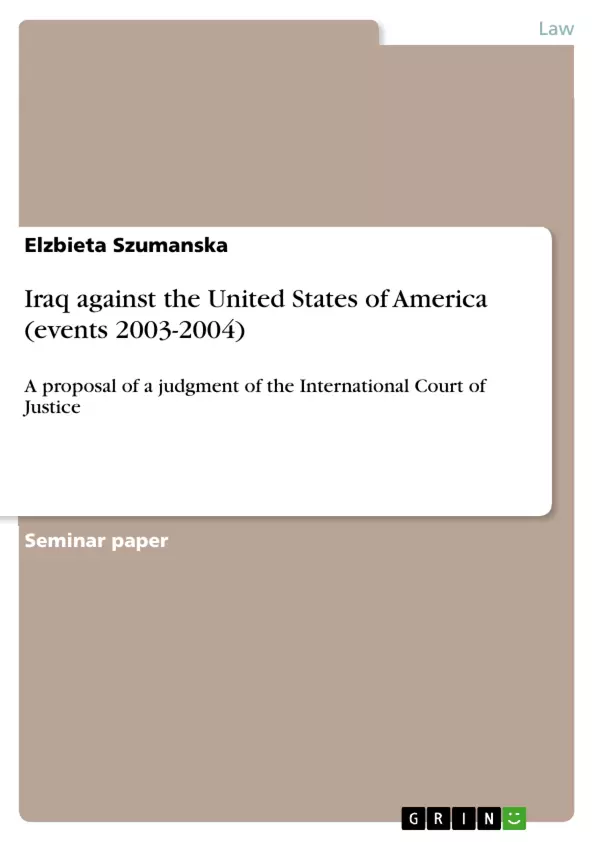In order to understand the “Second Iraq War”, to follow argumentation of both sides and to
deliver an appropriate judgment, firstly it is necessary to prove historical facts that have shaped
given situation.
Saddam Hussein came formally to power in July 1979 as a President and Chairman of the
Revolutionary Command Council. Hussein had the absolute power in Iraq and His control of the
military and all state institutions was beyond question. Under his leadership Iraq has never been a
democratic, peaceful state: systematically violated laws and human rights, mass killings, tortures
and political imprisonment led to a crisis which has become a subject of the dispute on international
stage till nowadays.
One of the conflicts, Hussein was involved in, was the war with Iran 1980-1988 for the
control over the waterway Shatt al-Arab. This warfare has grown from a much wider background:
Kurdish and Shiites problem, religious conflict, personal enmity between Hussein and Ayatollah
Komeini and Iraq’s gain to replace Iran’s leading position in the Arab world. As a result of the
conflict, where chemical and biological weapons were used, died and were wounded hundreds
thousands of people
The next aggressive step of Hussein’s government was the invasion of Kuwait in August
1990 behind an accusation that the state is stealing oil from Rumailah Fields and establishes
military bases within the Iraqi territory. An immediate reaction on the attack resulted in
international1 demanding of withdrawal of the Iraqi army from Kuwait by issuing several
resolutions2 against Iraq. When Saddam Hussein refused to fulfill their obligations the United
Nations Security Council put economic sanctions on Iraq (THE SC RESOLUTION 661). In
September 1990 the Security Council authorized United Nations Member States cooperating with
Kuwait government “to use necessary means to uphold and implement Resolution 660 and all
subsequent relevant resolutions” in order to restore peace (THE SC RESOLUTION 678). Hussein
refused to accomplish also this obligation and only the military operation “Dessert Storm” brought
the war between Iraq and Kuwait to the end (historyguy.com).
[...]
Inhaltsverzeichnis (Table of Contents)
- Historical and legal background
- Application
- Arguments of the Iraqi government
- Crimes against peace and security
- No proof of weapons of mass destruction in Iraq
- The use of armed forces without legal authorization
- Humanitarian crisis
- Failure to ensuring food and medical supplies
- Torture and prison abuses
- Destruction of object indispensable to the survival of the civilian population and failure to maintain order and cultural property
- Arguments of the US American government
- Protection of world's peace
- Weapon of mass destruction as a principal reasons for the US invasion
- Legal authorization for military operation and the doctrine of “Preventive War”
- Human rights abuses
- False allegations suggested by Iraq against the USA
- Iraqi practices of genocide, torture and prison abuses
- Proposal of a judgment
Zielsetzung und Themenschwerpunkte (Objectives and Key Themes)
This document presents a legal argument for a judgment of the International Court of Justice (ICJ) in a hypothetical case between Iraq and the United States, focusing on events from 2003-2004. The analysis explores the legal justifications for the "Second Iraq War," examining the claims and counterclaims of both sides. The document aims to provide a comprehensive legal framework for evaluating the legitimacy of the war. The key themes include:- International law and its application to the "Second Iraq War"
- The role of the ICJ in international disputes
- The legality of pre-emptive military action
- The impact of the war on human rights and humanitarian law
- The validity of claims regarding weapons of mass destruction
Zusammenfassung der Kapitel (Chapter Summaries)
The first chapter provides historical context and legal background for the conflict, tracing Iraq's history under Saddam Hussein, including the Iran-Iraq War and the invasion of Kuwait. It analyzes the role of international law in shaping events, particularly focusing on UN Security Council resolutions. The second chapter discusses the arguments presented by the Iraqi government, including accusations of crimes against peace, the lack of evidence for weapons of mass destruction, the illegal use of force, and humanitarian violations. The third chapter examines the arguments put forward by the US government, including the claim to protect world peace, the alleged threat posed by Iraq's weapons of mass destruction, the legal justification for military action, and the denial of human rights violations.Schlüsselwörter (Keywords)
The key terms and concepts explored in this text include international law, the International Court of Justice (ICJ), the "Second Iraq War," weapons of mass destruction (WMD), pre-emptive military action, human rights violations, humanitarian law, and the UN Security Council. The analysis focuses on the legal justifications for military intervention and the implications of such actions for international order.Frequently Asked Questions
What was the primary legal justification for the 2003 Iraq invasion according to the US?
The US argued that Iraq possessed weapons of mass destruction (WMD) and that military action was authorized under previous UN resolutions and the doctrine of "Preventive War."
What were Iraq's main arguments against the US military operation?
Iraq claimed the invasion was a crime against peace, lacked legal authorization from the UN Security Council, and caused a severe humanitarian crisis.
Who was Saddam Hussein?
He was the President of Iraq from 1979 to 2003, known for absolute power, human rights violations, and involvement in major conflicts like the Iran-Iraq War and the invasion of Kuwait.
What role did the UN Security Council play before the war?
The Council issued numerous resolutions (e.g., 660, 661, 678) following the invasion of Kuwait, imposing sanctions and later authorizing "all necessary means" to restore peace.
What humanitarian violations were alleged during the 2003-2004 period?
Allegations included failure to ensure medical supplies, torture, prison abuses (like Abu Ghraib), and the destruction of infrastructure indispensable to the civilian population.
- Arbeit zitieren
- Elzbieta Szumanska (Autor:in), 2008, Iraq against the United States of America (events 2003-2004), München, GRIN Verlag, https://www.grin.com/document/116944



